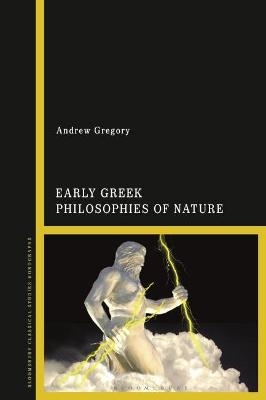
Early Greek Philosophies of Nature
Seiten
2020
Bloomsbury Academic (Verlag)
978-1-350-08097-3 (ISBN)
Bloomsbury Academic (Verlag)
978-1-350-08097-3 (ISBN)
This book examines the philosophies of nature of the early Greek thinkers and argues that a significant and thoroughgoing shift is required in our understanding of them. In contrast with the natural world of the earliest Greek literature, often the result of arbitrary divine causation, in the work of early Ionian philosophers we see the idea of a cosmos: ordered worlds where there is complete regularity. How was this order generated and maintained and what underpinned those regularities? What analogies or models were used for the order of the cosmos? What did they think about causation and explanatory structure? How did they frame natural laws?
Andrew Gregory draws on recent work on mechanistic philosophy and its history, on the historiography of the relation of science to art, religion and magic, and on the fragments and doxography of the early Greek thinkers to argue that there has been a tendency to overestimate the extent to which these early Greek philosophies of nature can be described as ‘mechanistic’. We have underestimated how far they were committed to other modes of explanation and ontologies, and we have underestimated, underappreciated and indeed underexplored how plausible and good these philosophies would have been in context.
Andrew Gregory draws on recent work on mechanistic philosophy and its history, on the historiography of the relation of science to art, religion and magic, and on the fragments and doxography of the early Greek thinkers to argue that there has been a tendency to overestimate the extent to which these early Greek philosophies of nature can be described as ‘mechanistic’. We have underestimated how far they were committed to other modes of explanation and ontologies, and we have underestimated, underappreciated and indeed underexplored how plausible and good these philosophies would have been in context.
Andrew Gregory is Professor of History and Philosophy of Science at University College London, UK. He is the author of many books on the science and philosophy of the ancient world, including Anaximander (Bloomsbury, 2016), The Presocratics and the Supernatural (Bloomsbury, 2013) and Ancient Greek Cosmogony (Bloomsbury, 2008).
Introduction
Ch. 1 – Methodological Issues
Ch. 2 – Order in Homer and Hesiod
Ch. 3 – Early Ideas on Knowledge and Learning
Ch. 4 – Anaximander and the Kubernan Tradition
Ch. 5 – New Explanations, New Philosophies of Nature
Ch. 6 – Anaximenes and the Kratein Tradition
Ch. 7 – Leucippus and Democritus
Ch. 8 – The Hippocratic Authors
Ch. 9 - Conclusion
Notes
Bibliography
Index
| Erscheinungsdatum | 02.10.2020 |
|---|---|
| Verlagsort | London |
| Sprache | englisch |
| Maße | 156 x 234 mm |
| Gewicht | 531 g |
| Themenwelt | Geisteswissenschaften ► Philosophie ► Metaphysik / Ontologie |
| Geisteswissenschaften ► Philosophie ► Philosophie Altertum / Antike | |
| ISBN-10 | 1-350-08097-7 / 1350080977 |
| ISBN-13 | 978-1-350-08097-3 / 9781350080973 |
| Zustand | Neuware |
| Informationen gemäß Produktsicherheitsverordnung (GPSR) | |
| Haben Sie eine Frage zum Produkt? |
Mehr entdecken
aus dem Bereich
aus dem Bereich
eine philosophische Reise
Buch | Softcover (2024)
Goldmann (Verlag)
CHF 19,55
Auf dem Weg zu einer postkritischen Philosophie
Buch | Softcover (2023)
Suhrkamp (Verlag)
CHF 53,20


